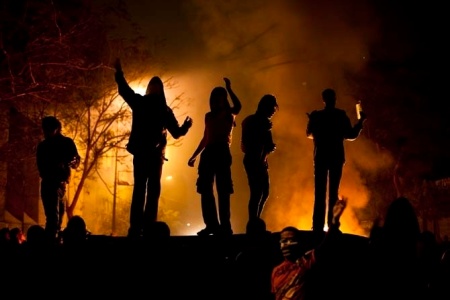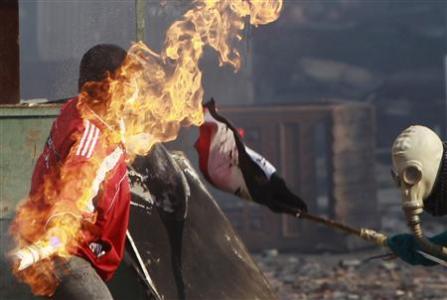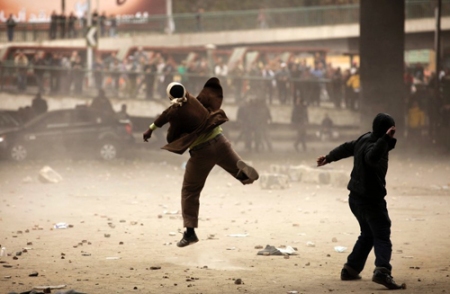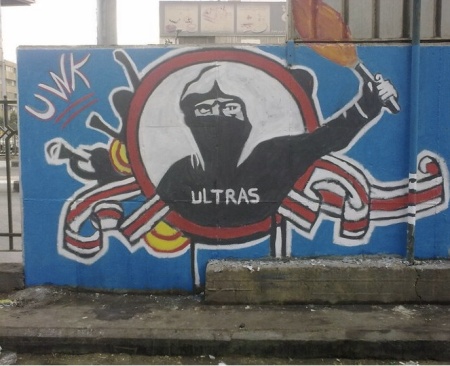
published at http://www.notbored.org/sine-mensuel.html

Penal Code Section 13514.5 requires the Commission on Peace Officer Standards and Training to establish guidelines and training for law enforcement’s response to crowd management and civil disobedience.
These guidelines contain information for law enforcement agencies to consider when addressing the broad range of issues related to crowd management and civil disobedience. The guidelines do not constitute a policy, nor are they intended to establish a standard for any agency. The Commission is sensitive to the needs for agencies to have individualized policies that reflect concern for local issues. The Commission intends these guidelines to be a resource for law enforcement executives that will provide maximum discretion and flexibility in the development of individual agency policies.
…
In the United States all people have the right of free speech and assembly guaranteed by the First Amendment of the Federal Constitution and California State Constitution. Law enforcement recognizes the right of free speech and actively protects people exercising that right.
The rights all people have to march, demonstrate, protest, rally, or perform other First Amendment activities comes with the responsibility to not abuse or violate the civil and property rights of others. The responsibility of law enforcement is to protect the lives and property of all people. Law enforcement should not be biased by the opinions being expressed nor by the race, gender, sexual orientation, physical disabilities, appearances, or affiliation of anyone exercising his/her lawful First Amendment rights. Law enforcement personnel must have the integrity to keep personal, political or religious views from affecting their actions.
When it becomes necessary to control the actions of a crowd that constitutes an unlawful assembly, the commitment and responsibility of law enforcement is to control lawfully, efficiently, and with minimal impact upon the community. A variety of techniques and tactics may be necessary to resolve a civil disobedience incident. Only that force which is objectively reasonable may be used to arrest violators and restore order.
All agencies should familiarize themselves with the terms, definitions, and guidelines set forth in this document. These are the generally accepted principles by which agencies respond to lawful and unlawful assemblies. The material in this document is designed to assist law enforcement executives in addressing the broad range of issues surrounding civil disobedience.
…
Guideline #9: Use of Force: Force Options
Agencies should develop use of force policies, procedures, and training for managing crowds and civil disobedience.
Discussion:
When dealing with crowds and civil disobedience situations, law enforcement must be a disciplined and well-organized control force. The decisions to use force and the force options that may be applied in response to these incidents range from law enforcement presence to deadly force. Peace officers need not use the least intrusive force option, but only that force which is objectively reasonable under the totality of the circumstances (Scott v. Henrich, 39 F. 3d 912, 9th Cir. 1994, and Forrester v. City of San Diego, 25 F. 3d 804 9th Cir. 1994). Graham v. Connor, 490 U.S. 386, 109 S. Ct. 1865, 104 L. Ed. 2d 443 (1989). The reasonableness of the force used to affect a particular seizure is analyzed under the Fourth Amendment and determined by balancing the nature and quality of the intrusion on the individual’s Fourth Amendment interests against the governmental interests at stake.
Prior to an event, agencies should continually review their use of force alternatives in response to potential actions by protesters. Training should reflect reasonable use of force alternatives in order that officers are prepared to consider the tactics/force options available. Chew v. Gates, 27 F. 3d 1432, 1443 (9th Cir. 1994).
* A Sampling of Use of Force Considerations:
* A Sampling of Force Options:
- Determine compliance or non-compliance of crowd
- Physically moving non-compliant offenders
- Anticipate possible actions of demonstrators
- Identify criminal violations involved
- Develop arrest protocol
- Develop use of pain compliance protocol
- Plan for disabled, elderly, and children demonstrators
- Determine availability of personnel
- Evaluate availability of other public safety resources
- Include protection devices for involved personnel
- Plan for the safety of bystanders
- Evaluate mobility of suspects/protestors
- Determine avenues of controlled departure
- Anticipate potential for medical resources
- Establish protocols for less lethal munitions
- Law enforcement presence
- Verbalization
- Firm grip
- Compliance techniques
- Control devices
- Nonlethal chemical agents
- Electrical control devices
- Impact weapons/batons
- Less lethal (i.e., sting balls, grenades, bean bags)
- Deadly force











...all these Void Network people
in Europe, in Amerikas, in the Outer Space...
we started realizing that there are existing out there thousands of creative friends, spiritual comrades, political, social and cultural activists, radical theoreticians and crazy thinkers, artists that hate the high-class luxury and space out motherfuckers that send us mails, announcements, manifestos, essays, videos, songs, they make contact with us, we find them on our way, we meet at the barricades, at the parties, the concerts, the second-hand vinyl record shops, we find them on the mountains, in the streets of Metropolis, in some seaside free campings on the outside border lines of the Empire, in the Rainbow Gatherings, in Eco-Communities, squatted universities, on the steps that leads to Ganga in Varanasi, in the middle of the tear gass, on the most dangerous streets of Mexico city or in a small village somewhere out-there in Africa...we meet sometimes in some specific illegal raves, sometimes in hardcore punk occupied buildings, or in strange lectures, in underground bars, in poetry shows and demonstrations... almost all around the world!
Void Mirror international digital magazine is dedicated in all our unknown friends!
Also we realised that there are existing thousands of interesting social struggles all around the world and there are existing parallel movements that don't know each other...even if they fight for really parallel reasons, in same fights, against same enemies, on the same destroyed planet...
Void Mirror is dedicated in all unknown social, political and cultural struggles of this world
And then...we realised also that there are existing millions and millions of possible links of wonderful, interesting, inspiring, mind exploding material out there in the digital space...music, arts, design, video art, political theory, poetry, utopia, analysis, critical thinking, advice, philosophy...created by fighting people, created by amateur intellectuals or university teachers, by crazy everyday life inspired philosophers and somehow all this information needs prismatic rearranging, free re-distribution, mechanisms of collecting, take care and share back again, space holes and electronic tubes that you can find all your favorite ideas coming together in inspirational general conclusions, anti-fragmentation magnetic forces...And we found for sure so many empty bottles in the sea-side sending some old maps to nowhereland, some old messages about treasures hiding in the end of mind, some great thoughts from some dead comrades that they had put all their dreams, decades ago, on a paper...in a bottle and they through them to the oceans of Time for the benefit of the future generation revolutionaries...
Void Mirror is dedicated to the culture, the dreams and the visions of the future generation Revolutionaries
It is a network of dreams and struggles, a net of hopes and understandings, a moment of clear mind, a good debate, a late-night fight with a lover, a last drink before going home...
It is more than anything else an Open Horizon, a VOID MIRROR


